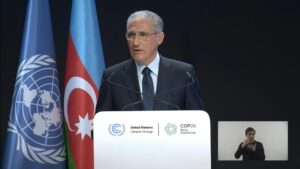Gaza coffee store owner turns coffee grounds into natural fertilizer
GAZA, Palestine – A Palestinian coffee store owner in the Gaza Strip is turning coffee grounds into organic fertilizer.
32-year-old Abdullah al-Safadi, who runs coffee shops in the region, started this environment friendly initiative during the COVID-19 pandemic.
He said the fertilizer made from the coffee grounds “provides the soil with the most important nutrients, nitrogen and magnesium”
The coffee store, with its two branches in the Rimal neighborhood in the center of Gaza City, produces more than 10 kilograms of fertilizer daily.
According to the Palestinian authorities, about 6-7 tons of coffee are consumed daily in the Gaza Strip, which is equivalent to 2,500 tons per year.
Turning coffee grounds into compost has spread to many parts of the world and has become a public feature.
Al-Safadi told Turkey’s Anadolu news agency that his staff consulted agricultural engineers and conducted a chemical study before embarking on the project.
“The cafe staff began collecting information about the conversion process, consulting agricultural engineers, and conducting a chemical study of the characteristics of coffee in government labs affiliated with the Agriculture Ministry in Gaza in November 2022,” he told the news agency.
He said they added little quantities of industrial fertilizer or lime to the organic fertilizer.
The coffee shop owner said his staff conducted preliminary experiments with organic fertilizers on plants grown in plastic containers in the cafe.
Scientific studies have shown that coffee grounds are among the best natural substances that help refresh the skin.
According to Al-Safadi, it is also sometimes used as a repellent to keep fungi and bacteria away from tomato plants.
After the price of chemical fertilizers skyrocketed due to the war between Russia and Ukraine, many European farms turned to coffee grounds as a natural fertilizer.
According to Al-Safadi, the fertilizer made from coffee grounds “provides the soil with the most important nutrients, nitrogen and magnesium”
The compost also contributes to the germination of earthworms, which turn over the soil and improve its aeration.
Converting coffee grounds into fertilizer also keeps sewage networks free of large amounts of plankton that cause blockages.
Al-Safadi said that large quantities of coffee grounds are produced daily in the Gaza Strip, most of which end up in the sewage system.











